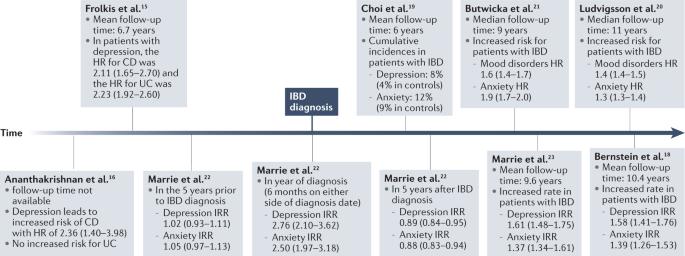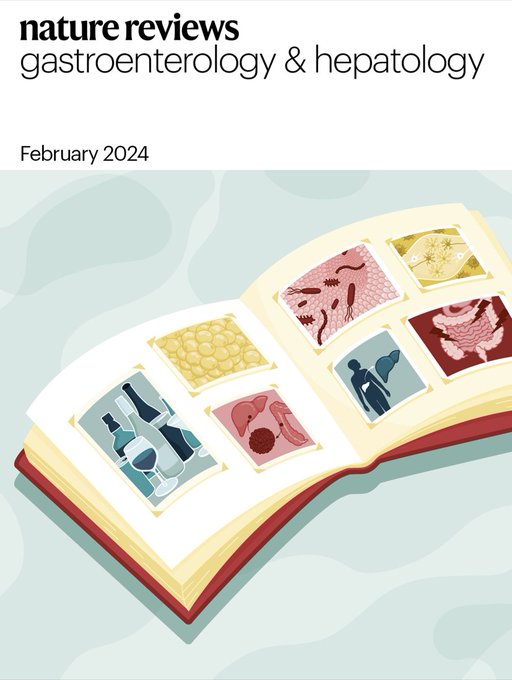Depression and anxiety in inflammatory bowel disease: epidemiology, mechanisms and treatment
IF 51
1区 医学
Q1 GASTROENTEROLOGY & HEPATOLOGY
引用次数: 62
Abstract
Inflammatory bowel disease (IBD), which includes Crohn’s disease and ulcerative colitis, is a chronic, relapsing immune-mediated disease with a varying and sometimes severe disease course. IBD is often diagnosed in early adulthood and can lead to a substantial decline in quality of life. It has been suggested that patients with IBD are at increased risk of depression and anxiety, but it is still unclear to what extent these diseases co-occur and in what sequence they arise. This Review summarizes the literature on the degree of co-occurrence of IBD with depression and anxiety and the temporal relationship between these diseases. We also discuss the effect of psychological stress on the onset and course of IBD. In addition, we outline the possible mechanisms underlying the co-occurrence of IBD and depression and anxiety, which include changes in brain signalling and morphology, increases in peripheral and intracerebral pro-inflammatory cytokines, impairment of the nitric oxide pathway, changes in vagal nerve signalling, gut dysbiosis and genetics. Finally, we examine the possible effects of treatment of depression and anxiety on the risk and course of IBD, the influence of psychological interventions on IBD, and the effects of IBD treatment on psychiatric comorbidity. In this Review, Jess and colleagues describe the prevalence of depression and anxiety in patients with inflammatory bowel disease, the mechanisms underlying the bidirectional association between these diseases and the effect of treatment on their co-occurrence.

炎症性肠病中的抑郁和焦虑:流行病学、机制和治疗
炎症性肠病(IBD)包括克罗恩病和溃疡性结肠炎,是一种慢性、复发性免疫介导疾病,病程长短不一,有时病情严重。IBD 通常在成年早期被诊断出来,可导致生活质量大幅下降。有人认为,IBD 患者患抑郁症和焦虑症的风险会增加,但目前仍不清楚这些疾病在多大程度上会同时发生,以及它们是按什么顺序出现的。本综述总结了有关 IBD 与抑郁和焦虑并发程度以及这些疾病之间时间关系的文献。我们还讨论了心理压力对 IBD 发病和病程的影响。此外,我们还概述了 IBD 与抑郁和焦虑并发的可能机制,其中包括大脑信号和形态的变化、外周和脑内促炎细胞因子的增加、一氧化氮通路的损伤、迷走神经信号的变化、肠道菌群失调和遗传。最后,我们研究了抑郁和焦虑治疗对 IBD 风险和病程的可能影响、心理干预对 IBD 的影响以及 IBD 治疗对精神疾病合并症的影响。在这篇综述中,杰斯及其同事描述了抑郁症和焦虑症在炎症性肠病患者中的发病率、这些疾病之间的双向关联机制以及治疗对其并发症的影响。
本文章由计算机程序翻译,如有差异,请以英文原文为准。
求助全文
约1分钟内获得全文
求助全文
来源期刊
CiteScore
52.30
自引率
0.60%
发文量
147
审稿时长
6-12 weeks
期刊介绍:
Nature Reviews Gastroenterology & Hepatology aims to serve as the leading resource for Reviews and commentaries within the scientific and medical communities it caters to. The journal strives to maintain authority, accessibility, and clarity in its published articles, which are complemented by easily understandable figures, tables, and other display items. Dedicated to providing exceptional service to authors, referees, and readers, the editorial team works diligently to maximize the usefulness and impact of each publication.
The journal encompasses a wide range of content types, including Research Highlights, News & Views, Comments, Reviews, Perspectives, and Consensus Statements, all pertinent to gastroenterologists and hepatologists. With its broad scope, Nature Reviews Gastroenterology & Hepatology ensures that its articles reach a diverse audience, aiming for the widest possible dissemination of valuable information.
Nature Reviews Gastroenterology & Hepatology is part of the Nature Reviews portfolio of journals.

 求助内容:
求助内容: 应助结果提醒方式:
应助结果提醒方式:


